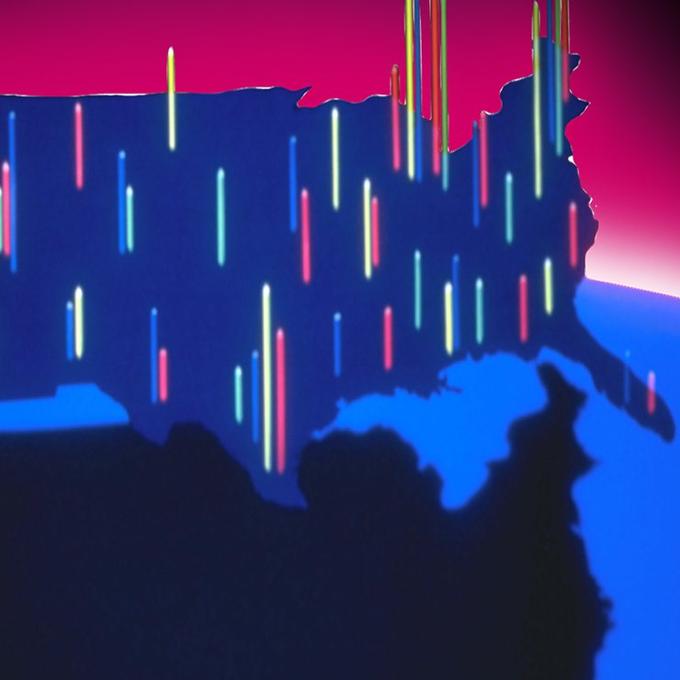About
Vaporwave is a musical genre inspired by electronic dance music (EDM), New Age music and the indie dance genres chillwave and seapunk. Vaporwave is known for its use of Japanese characters in song titles, 80’s smooth jazz and Muzak samples that have been pitch shifted and time stretched with music editing software. The genre has often been described as a satire of corporate and consumerist culture and modern capitalism, specifically as a critique of mainstream EDM.
History
According to an article in the Chicago Reader,[1] the vaporwave genre emerged on July 1st, 2011 with the release of the album New Dreams LTD. by Laserdisc Visions, which was later dubbed “vaporwave” by Texas producer Will Burnett.
The earliest known use of the term was printed in a review for the album Surfs Pure Hearts by Girlhood in the music blog Weed Temple[7] on October 13th. 2011.
Precursor
There have been a number of albums described by many in the vaporwave community to be catalysts of sorts for the genre or “proto-vaporwave”. These albums include a release from Daniel Lopatin (also known as Oneohtrix Point Never) under Chuck Person titled Chuck Person’s Eccojams Vol. 1 (shown below, left) and James Ferraro’s album Far Side Virtual (shown below, right). Eccojams’ music consists of what Lopatin termed “echo jams,” where forms of popular music, usually originating from the 80s, are slowed down and sometimes looped repeatedly, similar to that of chopped-and-screwed. Ferraro’s Far Side Virtual’s themes and style are similar to that of vaporwave, with globalization, internet culture, and a critique of modern consumerist culture along with a music style reminiscent to that of elevator music.
Reception
In December 2012, the music blog /mu/essentials[3], run by members of 4chan’s music board, posted a graphic for “Essential Vaporwave” (shown below).

On December 7th, the music blog Dummy[8] published an article about vaporwave, which described it as a satire of capitalism. On January 24th, 2013, the Tumblr[5] blog “Vaporwave Album Covers” was launched, which highlights album art from notable vaporwave artists (shown below).



On March 4th, a vaporwave thread was submitted to the /mu/ (music) board on 4chan,[6] where many users recommended their favorite vaporwave albums. On March 19th, the music blog Another County Heard[4] published an article titled “The Verdict on Vaporwave,” which noted how many Internet commenters had declared vaporwave to be “over.” On December 27th, Vice[2] published an article comparing vaporwave to seapunk, quoting several forum commenter descriptions of the genre as “chillwave for Marxists,” “post-elevator music” and “corporate smooth jazz Windows 95 pop.”
In January of 2015, 2814, the collaborative project of Hong Kong Express and t e l e p a t h テレパシー能力者, released their second album 新しい日の誕生 (English: Birth of a New Day, shown above) on Dream Catalogue. Described as being one of the first vaporwave albums to use original instrumentation unlike other vaporwave albums, which use sampling of older songs, it has been well received by both critics and fans as well, with Tiny Mix Tapes giving it a 4/5[9], a RateYourMusic rating of 3.46/5[10], and Rolling Stone featuring 2814 on their “10 New Artists You Need to Know” list for November 2015[11].
Impact
Notable Videos
Search Interest
External References
[1]Chicago Reader – Vaporwave and the observer effect
[2]Vice – Is Vaporwave the New Seapunk
[3]Muessentials – Essential vaporwave
[4]Another County Heard – The Verdict on Vaporwave
[5]Tumblr – Vaporwave Album Covers
[7]Weed Template – Review – Girlhood Surfs Pure Hearts
[9]Tiny Mix Tapes – Music Review: 2814 – 新しい日の誕生
[11]Rolling Stone – 10 New Artists You Need to Know: November 2015